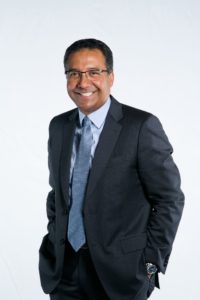‘My entire career has been about my credibility. If I can’t deliver and I lose that credibility with clients, then I’m done.’
 Michael Dominguez likes to think about what might have been — or what wouldn’t have been if he’d made a different decision and taken a different path. Like when the San Antonio native, who spent his weekends during the last two years of high school bussing tables at the Hyatt San Antonio, received a full scholarship to Texas A&M University after having dreamed for years of attending the University of Texas at Austin. He visited A&M and disliked it on sight, and even though his parents couldn’t afford to send him anywhere else, he declined the scholarship and started taking classes at UT San Antonio while continuing to work at the Hyatt, later finishing up at UT Austin.
Michael Dominguez likes to think about what might have been — or what wouldn’t have been if he’d made a different decision and taken a different path. Like when the San Antonio native, who spent his weekends during the last two years of high school bussing tables at the Hyatt San Antonio, received a full scholarship to Texas A&M University after having dreamed for years of attending the University of Texas at Austin. He visited A&M and disliked it on sight, and even though his parents couldn’t afford to send him anywhere else, he declined the scholarship and started taking classes at UT San Antonio while continuing to work at the Hyatt, later finishing up at UT Austin.
“I look at that decision, and I can honestly tell you, we’re not having this conversation if I go to A&M,” Dominguez said in a recent interview with HSMAI. “I would’ve never stayed in the hotel business, and more importantly, I would have never met my wife of 32 years, who was working at the front desk [at the Hyatt]. Had I gone to A&M, I don’t meet my wife, I don’t have my kids, I don’t have my grandkids. Doesn’t mean I don’t have grandkids and kids, it’s just not the ones that I currently have.”
Nor would he have HSMAI’s Award for Lifetime Achievement in Sales, which was presented at the Sales Leader Forum in Charlotte, North Carolina, on Oct. 26 — in recognition of a career that’s taken him from part-time catering work at the Hyatt to his current position as president and CEO of Associated Luxury Hotels International (ALHI). In between he blazed a path through hospitality sales, starting with nine years in F&B operations before serving as vice president of sales and services for Visit Palm Springs, vice president of global sales for Loews Hotels, and senior vice president and chief sales officer for MGM Resorts International, with stints as chair of Meeting Professionals International and on the executive committee of the Meetings Mean Business Coalition.
“When you think about any type of recognition,” Dominguez said, “to have people that are your peers and that commit themselves to the same discipline you have recognize you for the work that you’ve done for the industry specifically, it’s not only an honor, but it’s quite humbling. And in the comments I received from people reaching out, I love that it’s always the same: Thank you for what you’ve done for the industry. That matters to me, because more than anything, I have a passion and a love for this industry that still drives me.”
Here are five other things we learned about Mike Dominguez during our conversation:
1. Another “what if” moment: the 1989 Loma Prieta earthquake in San Francisco. “My food-and-beverage director from the Hyatt San Antonio, who started me in this business, had gotten transferred to the Hyatt Burlingame [in the Bay Area] two weeks before the earthquake. The earthquake shut that hotel down in Burlingame, and they moved that entire crew to the Hyatt Suites in Palm Springs for the opening. I get a phone call, he pulls me from Austin to Palm Springs to run F&B, but the general manager is a guy who used to run Hyatt’s worldwide sales. And he’s the one who took me out of operations and said, ‘You don’t belong here. You belong in sales.’ Those moments really do change the entire trajectory of your life.”
2. His first job in hotel sales ended up with the federal government. “I was a sales director at Hotel Indian Wells, which is an independent hotel in the Palm Springs area. We were owned by a Japanese owner, and he had built this really special, 150-room boutique hotel, with a country club behind it. My career started off in an interesting way, because we were seized by the U.S. customs department. I worked for two years with a government contractor called EG&G that works for the customs department, and they managed the asset for those two years. I reported to an old naval pilot who was overseeing us for those two years before they auctioned us off into a sale. That was my first role.”
3. Hotel sales isn’t really about selling. “I love to serve, and if you love to serve people and take care of people, then I really think we overthink it on sales. How can you serve a client? And how can you make sure you fulfill their needs? One client in particular that we’ve been dear friends for 20 years — it took her 15 years before she ever booked a piece of business with me, because I was never at the right hotel for her, and I would tell her that. There’s a couple of times she’s tried to bring me a piece of business and I’ve said, no, I am not the right fit, and all we will do is disappoint. It’s not about selling, it’s all about relationships. To me, my entire career has been about my credibility. If I can’t deliver and I lose that credibility with clients, then I’m done. And it’s the only thing I have to offer.”
4. Sales was the perfect background for a CEO role. “I approach my job a little differently than others, I think, in that I am still so engaged with our customers, our salespeople, and the process on a daily basis. I think sometimes we get separated from that as executives. I’m a big believer that I don’t like a love fest. Tell me how to improve and tell me how to improve the process. I don’t know how to help my salespeople more if I’m not that engaged. That has helped me tremendously in the role I have now, because I have 300 members, and I can assure you that I brought a great deal of confidence to their sales leadership right off the bat because they know I’ve sat in their chair. They know I completely understand what they’re going through every day. That to me is critical, because I think sometimes we get separated from it and you really don’t know what’s going on in the field.”
5. The pandemic has offered opportunities to build trust and community. “When we started shutting down the country, I’d been on the road and I was trying to get home, and I sent [ALHI employees] an email saying, everybody hold on, but it’s going to be okay. And they’re like, could you do a call because it would be nice to hear your voice and be able to talk about this? So, we had that call on a Friday, and from that moment, I said, we are going to have this call every day until we don’t. And we are still having that call today. It is an entire-company call, and the only thing we’ve done now in the last 90 days is change the cadence to three times a week versus five times a week. But we are still having this call to bring everyone together.
“It’s an opportunity to talk about the environment and have open discussions. They were looking at my cash flow before my owners did. I wanted them to understand exactly where we were as a company, so they don’t have to guess. I’m showing them exactly what’s happening and what’s not. All I got were emails saying, ‘Thank you. I’m glad to have a job. Thank you for being transparent.’ This is something I’ve learned as a leader: Absent the real story, people will create their own.
“And then the other piece of this was, there was so much noise in the industry, I ended up creating these client calls that I’m still doing right now. We have anywhere from 400 to 500 meeting planners that jump on with us every week. It’s explaining where we are with COVID, where we’re not with COVID, and what we’re hearing in the industry. Getting through the noise, because there’s so much chaos out there. We’ve built this community, and clients have kept saying, ‘Mike, your your weekly calls kept me from jumping off a ledge many times, because it was a calming voice.’ This was an opportunity, and it wasn’t planned. That’s the important part of how I’ve spent my career: It’s been organic, and I’ve tried to serve and fulfill needs.”
